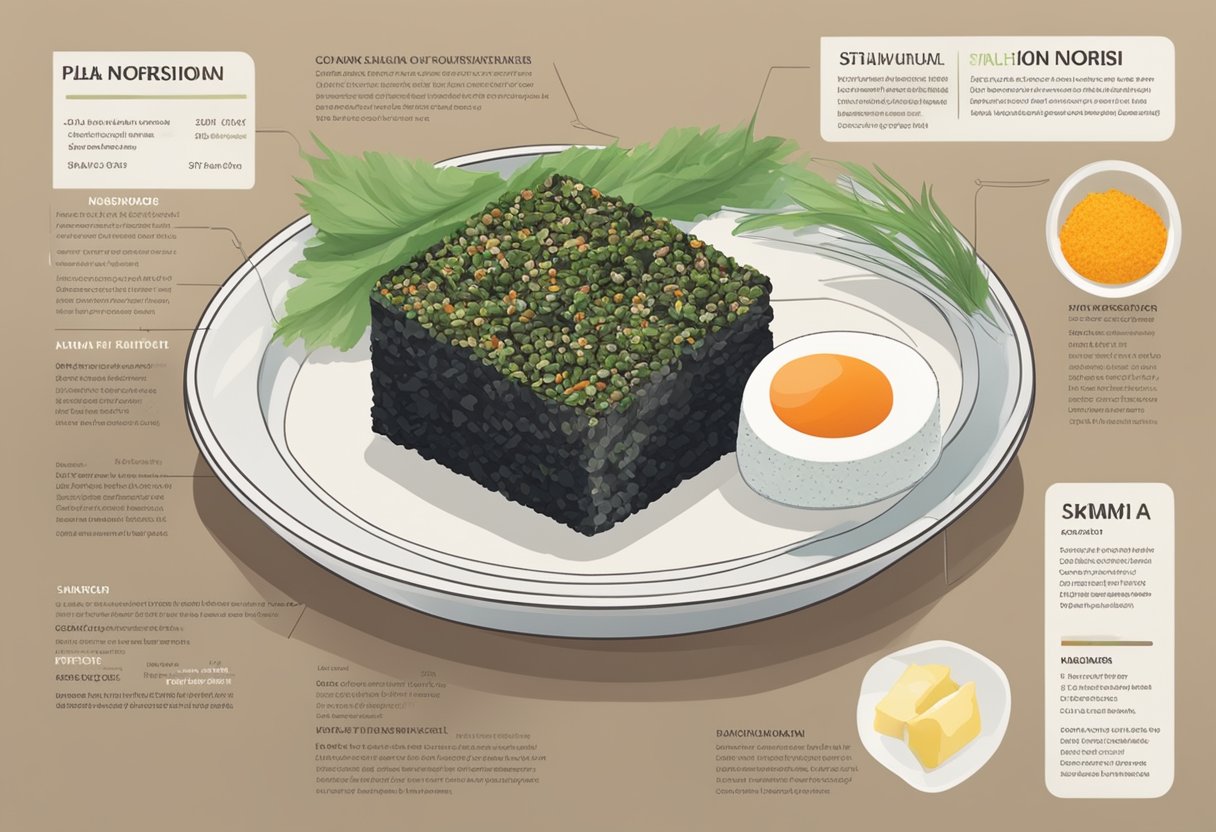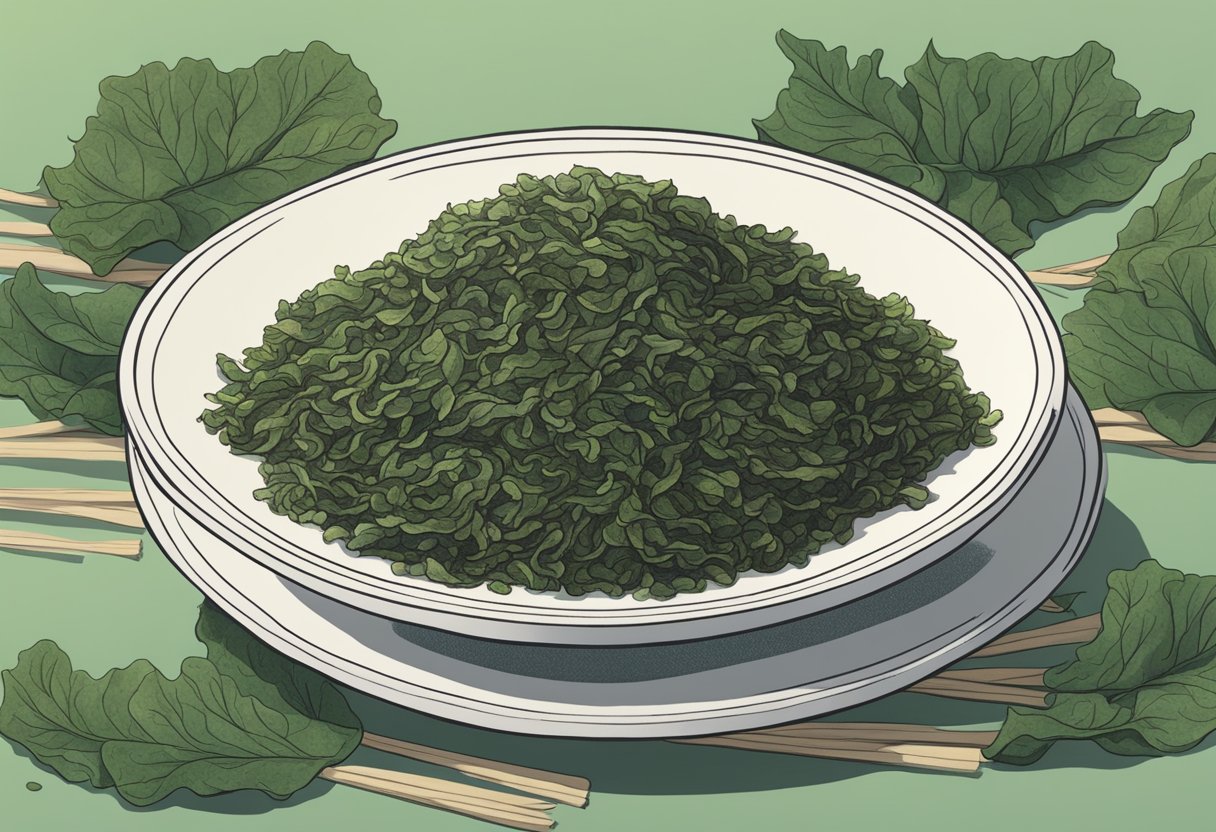Nori is a type of edible seaweed that has gained popularity outside its traditional Asian cuisine due to its unique flavor and health benefits. Often associated with sushi, nori is not limited to being a wrap for rice and fish; its culinary uses extend into a variety of dishes including soups, salads, and snacks. As consumers become more health-conscious, nori is commonly questioned for its nutritional value and potential health impacts.
Nutritionally, nori is a low-calorie food rich in vitamins, minerals, and antioxidants. It is particularly noted for its high content of iodine, which is essential for thyroid function, as well as its source of vitamin B12, often sought after by those following a vegetarian or vegan lifestyle. While nori provides a range of beneficial nutrients, like all foods, it should be consumed in moderation.
Despite its healthful properties, there are considerations to keep in mind, including the potential for heavy metal content and the importance of sourcing from reputable suppliers to minimize risk. Understanding nori's place in a balanced diet is important for health-conscious individuals looking to incorporate nutrient-dense foods into their meal planning.

Key Takeaways
- Nori is valued for its unique flavor and versatility in dishes beyond traditional sushi rolls.
- It is rich in essential nutrients like iodine and vitamin B12, making it a beneficial addition to many diets.
- Considerations for consumption include potential heavy metal content and the importance of reputable sourcing.
Nutritional Profile of Nori

Nori, a type of seaweed often used in Japanese cuisine, is recognized for its distinct nutritional benefits. This section breaks down the nutritional components of nori, including its content of vitamins and minerals, macronutrients, and dietary fiber.
Vitamins and Minerals
Nori is a rich source of various vitamins and essential minerals. It provides a significant amount of Vitamin A, which is crucial for eyesight and immune function. Additionally, nori is known for its high content of Vitamin C and the B vitamins, particularly Vitamin B12, which is rare in plant foods and critical for nerve function and blood cell formation. Mineral-wise, nori is an excellent source of iodine, necessary for thyroid health, and it contains iron, calcium, and magnesium.
| Vitamin | Amount |
|---|---|
| Vitamin A | High |
| Vitamin B12 | Significant |
| Vitamin C | Present |
| Mineral | Amount |
|---|---|
| Iodine | High |
| Iron | Moderate |
| Calcium | Moderate |
| Magnesium | Moderate |
Macronutrients
Regarding macronutrients, nori is low in calories but contains a mix of protein, carbohydrates, and a minimal amount of fats. The protein in nori is particularly notable for being complete, meaning it includes all essential amino acids. The carbohydrate content consists largely of simple sugars and a small amount of starch.
| Macronutrient | Amount |
|---|---|
| Protein | Complete |
| Carbohydrates | Low |
| Fats | Minimal |
Dietary Fiber Content
Nori provides dietary fiber, which supports digestive health and can help in maintaining healthy blood sugar levels. The fiber in nori is both soluble and insoluble, assisting not only in digestion but also in providing a feeling of fullness.
| Fiber Type | Benefit |
|---|---|
| Soluble | Digestive health |
| Insoluble | Satiety |
The dietary components present in nori make it a nutritious food that contributes positively to overall diet and health when consumed as part of a balanced diet.
Health Benefits of Nori

Nori, a type of seaweed, is regarded as a nutritious food that offers various health benefits. This edible seaweed is often used in Japanese cuisine and is rich in vitamins, minerals, and dietary fiber.
Heart Health
Nori contains omega-3 fatty acids, which are known to support heart health by helping to reduce blood pressure and lower the risk of heart disease. It is also a source of eicosapentaenoic acid (EPA), a component of omega-3s beneficial for cardiovascular wellness. EPA specifically helps in the regulation of blood clotting and inflammation.
Digestive Health
Rich in dietary fiber, nori aids in promoting digestive health. The fiber content helps to regulate bowel movements and prevent constipation. It also fosters the growth of beneficial gut bacteria, which is critical for a well-functioning digestive system. Additionally, the fiber in nori can help in the detoxification process of the gastrointestinal tract.
Weight Management
Low in calories and high in fiber, nori can be a beneficial addition to a weight management diet. The fiber provides a feeling of fullness, which may help reduce overall calorie intake by decreasing the likelihood of overeating. Moreover, the iodine present in nori helps to support thyroid function, which plays a pivotal role in regulating metabolism.
Culinary Uses of Nori

Nori, a type of seaweed, is an integral component in Japanese cuisine, most prominently recognized for its role in sushi rolls. This edible seaweed comes in dark green, nearly black sheets that offer a crisp texture and a savory umami flavor.
Traditional Uses:
- Sushi: Nori sheets serve as a wrapping material for sushi rolls (makizushi), contributing not only to the structure but also to the overall flavor profile.
- Onigiri: Nori wraps around rice balls (onigiri), providing a convenient grip and a salty, sea-tinged taste.
Modern Adaptations:
- Snacks: Health-conscious individuals often consume nori as a low-calorie, nutrient-rich snack. The seaweed can be eaten on its own or included in a mix of dried fruits and nuts.
- Seasoning: Toasted nori flakes or powder often serves as a condiment for various dishes such as noodles, soups, and salads, enhancing them with a distinctive marine savoriness.
| Forms of Nori | Uses in Cooking |
|---|---|
| Whole Sheets | Sushi, Onigiri |
| Flakes | Toppings, Mixes |
| Powder | Seasonings |
In addition to its culinary versatility, the health aspects of nori are noteworthy. It's rich in vitamins A, B, and C, as well as minerals like iodine, and is low in calories, making it a nutritious food to include in a balanced diet.
Dietary Notes:
- Nori is gluten-free and suitable for vegetarians and vegans, aligning with various dietary preferences.
- Its high vitamin and mineral content supports the belief that nori is a healthful addition to one's diet.
By incorporating nori in various forms into different meals, individuals can enjoy its unique flavor while also taking advantage of its potential health benefits.
Potential Risks and Considerations

When discussing if nori seaweed is healthy, it is essential to consider its iodine content and potential exposure to heavy metals, which may pose health risks if consumed in excessive amounts.
Iodine Content
Nori, like other seaweeds, is a rich source of iodine, an essential nutrient for thyroid function. However, excessive iodine intake can lead to thyroid disorders. The recommended daily allowance (RDA) for iodine varies by age and life stage, with most adults requiring about 150 micrograms per day.
| Life Stage | Recommended Daily Allowance of Iodine |
|---|---|
| Adults | 150 µg |
| Pregnancy | 220 µg |
| Lactation | 290 µg |
It's crucial for consumers to monitor their iodine intake, especially if they consume nori regularly, to avoid surpassing these suggested levels.
Heavy Metals Exposure
Seaweed, including nori, can absorb heavy metals from its marine environment. The concentration of heavy metals, such as lead, mercury, and cadmium, in nori is usually low but can vary depending on the water quality where it was grown. Long-term exposure to heavy metals may pose health risks, including neurotoxicity and renal impairment.
- Typical heavy metal concentrations in nori (per gram):
- Lead: Less than 3 micrograms
- Mercury: Less than 0.01 micrograms
- Cadmium: Less than 2 micrograms
Regularly consuming nori from polluted waters may increase the risk of accumulating harmful levels of heavy metals. Therefore, sourcing nori from clean, non-contaminated waters is advisable to mitigate this risk.
Frequently Asked Questions
Nori, a type of seaweed, has gained popularity for its nutritional benefits. The following are common inquiries about its health implications.
What are the health benefits associated with consuming nori?
Nori is rich in vitamins A, C, and E, as well as minerals like iodine and iron. It also contains protein and dietary fiber, which are essential for maintaining bodily functions and supporting a healthy digestive system.
Can eating nori contribute to weight loss efforts?
Due to its high fiber content and low calorie count, nori can be a beneficial addition to a weight loss diet. It can promote satiety while providing essential nutrients without adding excessive calories.
Is nori seaweed healthy?
Nori seaweed is considered healthy for most individuals when consumed as part of a balanced diet. Its nutrient profile supports thyroid function due to its iodine content and contributes to a strong immune system with its antioxidants.




